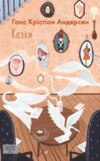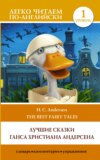Kitabı oku: «Fairy Tales of Hans Christian Andersen», sayfa 8
DELAYING IS NOT FORGETTING
There was an old mansion surrounded by a marshy ditch with a drawbridge which was but seldom let down: – not all guests are good people. Under the roof were loopholes to shoot through, and to pour down boiling water or even molten lead on the enemy, should he approach. Inside the house the rooms were very high and had ceilings of beams, and that was very useful considering the great deal of smoke which rose up from the chimney fire where the large, damp logs of wood smouldered. On the walls hung pictures of knights in armour and proud ladies in gorgeous dresses; the most stately of all walked about alive. She was called Meta Mogen; she was the mistress of the house, to her belonged the castle.
Towards the evening robbers came; they killed three of her people and also the yard-dog, and attached Mrs. Meta to the kennel by the chain, while they themselves made good cheer in the hall and drank the wine and the good ale out of her cellar. Mrs. Meta was now on the chain, she could not even bark.
But lo! the servant of one of the robbers secretly approached her; they must not see it, otherwise they would have killed him.
"Mrs. Meta Mogen," said the fellow, "do you still remember how my father, when your husband was still alive, had to ride on the wooden horse? You prayed for him, but it was no good, he was to ride until his limbs were paralysed; but you stole down to him, as I steal now to you, you yourself put little stones under each of his feet that he might have support, nobody saw it, or they pretended not to see it, for you were then the young gracious mistress. My father has told me this, and I have not forgotten it! Now I will free you, Mrs. Meta Mogen!"
Then they pulled the horses out of the stable and rode off in rain and wind to obtain the assistance of friends.
"Thus the small service done to the old man was richly rewarded!" said Meta Mogen.
"Delaying is not forgetting," said the fellow.
The robbers were hanged.
There was an old mansion, it is still there; it did not belong to Mrs. Meta Mogen, it belonged to another old noble family.
We are now in the present time. The sun is shining on the gilt knob of the tower, little wooded islands lie like bouquets on the water, and wild swans are swimming round them. In the garden grow roses; the mistress of the house is herself the finest rose petal, she beams with joy, the joy of good deeds: however, not done in the wide world, but in her heart, and what is preserved there is not forgotten. Delaying is not forgetting!
Now she goes from the mansion to a little peasant hut in the field. Therein lives a poor paralysed girl; the window of her little room looks northward, the sun does not enter here. The girl can only see a small piece of field which is surrounded by a high fence. But to-day the sun shines here – the warm, beautiful sun of God is within the little room; it comes from the south through the new window, where formerly the wall was.
The paralysed girl sits in the warm sunshine and can see the wood and the lake; the world had become so large, so beautiful, and only through a single word from the kind mistress of the mansion.
"The word was so easy, the deed so small," she said, "the joy it afforded me was infinitely great and sweet!"
And therefore she does many a good deed, thinks of all in the humble cottages and in the rich mansions, where there are also afflicted ones. It is concealed and hidden, but God does not forget it. Delayed is not forgotten!
An old house stood there; it was in the large town with its busy traffic. There are rooms and halls in it, but we do not enter them, we remain in the kitchen, where it is warm and light, clean and tidy; the copper utensils are shining, the table as if polished with beeswax; the sink looks like a freshly scoured meatboard. All this a single servant has done, and yet she has time to spare as if she wished to go to church; she wears a bow on her cap, a black bow, that signifies mourning. But she has no one to mourn, neither father nor mother, neither relations nor sweetheart. She is a poor girl. One day she was engaged to a poor fellow; they loved each other dearly.
One day he came to her and said:
"We both have nothing! The rich widow over the way in the basement has made advances to me; she will make me rich, but you are in my heart; what do you advise me to do?"
"I advise you to do what you think will turn out to your happiness," said the girl. "Be kind and good to her, but remember this; from the hour we part we shall never see each other again."
Years passed; then one day she met the old friend and sweetheart in the street; he looked ill and miserable, and she could not help asking him, "How are you?"
"Rich and prospering in every respect," he said; "the woman is brave and good, but you are in my heart. I have fought the battle, it will soon be ended; we shall not see each other again now until we meet before God!"
A week has passed; this morning his death was in the newspaper, that is the reason of the girl's mourning! Her old sweetheart is dead and has left a wife and three step-children, as the paper says; it sounds as if there is a crack, but the metal is pure.
The black bow signifies mourning, the girl's face points to the same in a still higher degree; it is preserved in the heart and will never be forgotten. Delaying is not forgetting!
These are three stories you see, three leaves on the same stalk. Do you wish for some more trefoil leaves? In the little heartbook are many more of them. Delaying is not forgetting!
THE DROP OF WATER
Of course you know what is meant by a magnifying glass – one of those round spectacle-glasses that make everything look a hundred times bigger than it is? When any one takes one of these and holds it to his eye, and looks at a drop of water from the pond yonder, he sees above a thousand wonderful creatures that are otherwise never discerned in the water. But there they are, and it is no delusion. It almost looks like a great plateful of spiders jumping about in a crowd. And how fierce they are! They tear off each other's legs and arms and bodies, before and behind; and yet they are merry and joyful in their way.
Now, there once was an old man whom all the people called Kribble-Krabble, for that was his name. He always wanted the best of everything, and when he could not manage it otherwise, he did it by magic.
There he sat one day, and held his magnifying-glass to his eye, and looked at a drop of water that had been taken out of a puddle by the ditch. But what a kribbling and krabbling was there! All the thousands of little creatures hopped and sprang and tugged at one another, and ate each other up.
"That is horrible!" said old Kribble-Krabble. "Can one not persuade them to live in peace and quietness, so that each one may mind his own business?"
And he thought it over and over, but it would not do, and so he had recourse to magic.
"I must give them color, that they may be seen more plainly," said he; and he poured something like a little drop of red wine into the drop of water, but it was witches' blood from the lobes of the ear, the finest kind, at ninepence a drop. And now the wonderful little creatures were pink all over. It looked like a whole town of naked wild men.
"What have you there?" asked another old magician, who had no name – and that was the best thing about him.
"Yes, if you can guess what it is," said Kribble-Krabble, "I'll make you a present of it."
But it is not so easy to find out if one does not know.
And the magician who had no name looked through the magnifying-glass.
It looked really like a great town reflected there, in which all the people were running about without clothes. It was terrible! But it was still more terrible to see how one beat and pushed the other, and bit and hacked, and tugged and mauled him. Those at the top were being pulled down, and those at the bottom were struggling upwards.
"Look! look! his leg is longer than mine! Bah! Away with it! There is one who has a little bruise. It hurts him, but it shall hurt him still more."
And they hacked away at him, and they pulled at him, and ate him up, because of the little bruise. And there was one sitting as still as any little maiden, and wishing only for peace and quietness. But now she had to come out, and they tugged at her, and pulled her about, and ate her up.
"That's funny!" said the magician.
"Yes; but what do you think it is?" said Kribble-Krabble. "Can you find that out?"
"Why, one can see that easily enough," said the other. "That's Paris, or some other great city, for they're all alike. It's a great city!"
"It's a drop of puddle water!" said Kribble-Krabble.
THE DRYAD
We are travelling to Paris to the Exhibition.
Now we are there. That was a journey, a flight without magic. We flew on the wings of steam over the sea and across the land.
Yes, our time is the time of fairy tales.
We are in the midst of Paris, in a great hotel. Blooming flowers ornament the staircases, and soft carpets the floors.
Our room is a very cosy one, and through the open balcony door we have a view of a great square. Spring lives down there; it has come to Paris, and arrived at the same time with us. It has come in the shape of a glorious young chestnut tree, with delicate leaves newly opened. How the tree gleams, dressed in its spring garb, before all the other trees in the place! One of these latter had been struck out of the list of living trees. It lies on the ground with roots exposed. On the place where it stood, the young chestnut tree is to be planted, and to flourish.
It still stands towering aloft on the heavy wagon which has brought it this morning a distance of several miles to Paris. For years it had stood there, in the protection of a mighty oak tree, under which the old venerable clergyman had often sat, with children listening to his stories.
The young chestnut tree had also listened to the stories; for the Dryad who lived in it was a child also. She remembered the time when the tree was so little that it only projected a short way above the grass and ferns around. These were as tall as they would ever be; but the tree grew every year, and enjoyed the air and the sunshine, and drank the dew and the rain. Several times it was also, as it must be, well shaken by the wind and the rain; for that is a part of education.
The Dryad rejoiced in her life, and rejoiced in the sunshine, and the singing of the birds; but she was most rejoiced at human voices; she understood the language of men as well as she understood that of animals.
Butterflies, cockchafers, dragon-flies, everything that could fly came to pay a visit. They could all talk. They told of the village, of the vineyard, of the forest, of the old castle with its parks and canals and ponds. Down in the water dwelt also living beings, which, in their way, could fly under the water from one place to another – beings with knowledge and delineation. They said nothing at all; they were so clever!
And the swallow, who had dived, told about the pretty little goldfish, of the thick turbot, the fat brill, and the old carp. The swallow could describe all that very well, but, "Self is the man," she said. "One ought to see these things one's self." But how was the Dryad ever to see such beings? She was obliged to be satisfied with being able to look over the beautiful country and see the busy industry of men.
It was glorious; but most glorious of all when the old clergyman sat under the oak tree and talked of France, and of the great deeds of her sons and daughters, whose names will be mentioned with admiration through all time.
Then the Dryad heard of the shepherd girl, Joan of Arc, and of Charlotte Corday; she heard about Henry the Fourth, and Napoleon the First; she heard names whose echo sounds in the hearts of the people.
The village children listened attentively, and the Dryad no less attentively; she became a school-child with the rest. In the clouds that went sailing by she saw, picture by picture, everything that she heard talked about. The cloudy sky was her picture-book.
She felt so happy in beautiful France, the fruitful land of genius, with the crater of freedom. But in her heart the sting remained that the bird, that every animal that could fly, was much better off than she. Even the fly could look about more in the world, far beyond the Dryad's horizon.
France was so great and so glorious, but she could only look across a little piece of it. The land stretched out, world-wide, with vineyards, forests and great cities. Of all these Paris was the most splendid and the mightiest. The birds could get there; but she, never!
Among the village children was a little ragged, poor girl, but a pretty one to look at. She was always laughing or singing and twining red flowers in her black hair.
"Don't go to Paris!" the old clergyman warned her. "Poor child! if you go there, it will be your ruin."
But she went for all that.
The Dryad often thought of her; for she had the same wish, and felt the same longing for the great city.
The Dryad's tree was bearing its first chestnut blossoms; the birds were twittering round them in the most beautiful sunshine. Then a stately carriage came rolling along that way, and in it sat a grand lady driving the spirited, light-footed horses. On the back seat a little smart groom balanced himself. The Dryad knew the lady, and the old clergyman knew her also. He shook his head gravely when he saw her, and said:
"So you went there after all, and it was your ruin, poor Mary!"
"That one poor?" thought the Dryad. "No; she wears a dress fit for a countess" (she had become one in the city of magic changes). "Oh, if I were only there, amid all the splendor and pomp! They shine up into the very clouds at night; when I look up, I can tell in what direction the town lies."
Towards that direction the Dryad looked every evening. She saw in the dark night the gleaming cloud on the horizon; in the clear moonlight nights she missed the sailing clouds, which showed her pictures of the city and pictures from history.
The child grasps at the picture-books, the Dryad grasped at the cloud-world, her thought-book. A sudden, cloudless sky was for her a blank leaf; and for several days she had only had such leaves before her.
It was in the warm summer-time: not a breeze moved through the glowing hot days. Every leaf, every flower, lay as if it were torpid, and the people seemed torpid, too.
Then the clouds arose and covered the region round about where the gleaming mist announced "Here lies Paris."
The clouds piled themselves up like a chain of mountains, hurried on through the air, and spread themselves abroad over the whole landscape, as far as the Dryad's eye could reach.
Like enormous blue-black blocks of rock, the clouds lay piled over one another. Gleams of lightning shot forth from them.
"These also are the servants of the Lord God," the old clergyman had said. And there came a bluish dazzling flash of lightning, a lighting up as if of the sun itself, which could burst blocks of rock asunder. The lightning struck and split to the roots the old venerable oak. The crown fell asunder. It seemed as if the tree were stretching forth its arms to clasp the messengers of the light.
No bronze cannon can sound over the land at the birth of a royal child as the thunder sounded at the death of the old oak. The rain streamed down; a refreshing wind was blowing; the storm had gone by, and there was quite a holiday glow on all things. The old clergyman spoke a few words for honorable remembrance, and a painter made a drawing, as a lasting record of the tree.
"Everything passes away," said the Dryad, "passes away like a cloud, and never comes back!"
The old clergyman, too, did not come back. The green roof of his school was gone, and his teaching-chair had vanished. The children did not come; but autumn came, and winter came, and then spring also. In all this change of seasons the Dryad looked toward the region where, at night, Paris gleamed with its bright mist far on the horizon.
Forth from the town rushed engine after engine, train after train, whistling and screaming at all hours in the day. In the evening, towards midnight, at daybreak, and all the day through, came the trains. Out of each one, and into each one, streamed people from the country of every king. A new wonder of the world had summoned them to Paris.
In what form did this wonder exhibit itself?
"A splendid blossom of art and industry," said one, "has unfolded itself in the Champ de Mars, a gigantic sunflower, from whose petals one can learn geography and statistics, and can become as wise as a lord mayor, and raise one's self to the level of art and poetry, and study the greatness and power of the various lands."
"A fairy tale flower," said another, "a many-colored lotus-plant, which spreads out its green leaves like a velvet carpet over the sand. The opening spring has brought it forth, the summer will see it in all its splendor, the autumn winds will sweep it away, so that not a leaf, not a fragment of its root shall remain."
In front of the Military School extends in time of peace the arena of war – a field without a blade of grass, a piece of sandy steppe, as if cut out of the Desert of Africa, where Fata Morgana displays her wondrous airy castles and hanging gardens. In the Champ de Mars, however, these were to be seen more splendid, more wonderful than in the East, for human art had converted the airy deceptive scenes into reality.
"The Aladdin's Palace of the present has been built," it was said. "Day by day, hour by hour, it unfolds more of its wonderful splendor."
The endless halls shine in marble and many colors. "Master Bloodless" here moves his limbs of steel and iron in the great circular hall of machinery. Works of art in metal, in stone, in Gobelins tapestry, announce the vitality of mind that is stirring in every land. Halls of paintings, splendor of flowers, everything that mind and skill can create in the workshop of the artisan, has been placed here for show. Even the memorials of ancient days, out of old graves and turf-moors, have appeared at this general meeting.
The overpowering great variegated whole must be divided into small portions, and pressed together like a plaything, if it is to be understood and described.
Like a great table on Christmas Eve, the Champ de Mars carried a wonder-castle of industry and art, and around this knickknacks from all countries had been ranged, knickknacks on a grand scale, for every nation found some remembrance of home.
Here stood the royal palace of Egypt, there the caravanserai of the desert land. The Bedouin had quitted his sunny country, and hastened by on his camel. Here stood the Russian stables, with the fiery glorious horses of the steppe. Here stood the simple straw-thatched dwelling of the Danish peasant, with the Dannebrog flag, next to Gustavus Vasa's wooden house from Dalarne, with its wonderful carvings. American huts, English cottages, French pavilions, kiosks, theatres, churches, all strewn around, and between them the fresh green turf, the clear springing water, blooming bushes, rare trees, hothouses, in which one might fancy one's self transported into the tropical forest; whole gardens brought from Damascus, and blooming under one roof. What colors, what fragrance!
Artificial grottoes surrounded bodies of fresh or salt water, and gave a glimpse into the empire of the fishes; the visitor seemed to wander at the bottom of the sea, among fishes and polypi.
"All this," they said, "the Champ de Mars offers;" and around the great richly-spread table the crowd of human beings moves like a busy swarm of ants, on foot or in little carriages, for not all feet are equal to such a fatiguing journey.
Hither they swarm from morning till late in the evening. Steamer after steamer, crowded with people, glides down the Seine. The number of carriages is continually on the increase. The swarm of people on foot and on horseback grows more and more dense. Carriages and omnibuses are crowded, stuffed and embroidered with people. All these tributary streams flow in one direction – towards the Exhibition. On every entrance the flag of France is displayed; around the world's bazaar wave the flags of all nations. There is a humming and a murmuring from the hall of the machines; from the towers the melody of the chimes is heard; with the tones of the organs in the churches mingle the hoarse nasal songs from the cafes of the East. It is a kingdom of Babel, a wonder of the world!
In very truth it was. That's what all the reports said, and who did not hear them? The Dryad knew everything that is told here of the new wonder in the city of cities.
"Fly away, ye birds! fly away to see, and then come back and tell me," said the Dryad.
The wish became an intense desire – became the one thought of a life. Then, in the quiet silent night, while the full moon was shining, the Dryad saw a spark fly out of the moon's disc, and fall like a shooting star. And before the tree, whose leaves waved to and fro as if they were stirred by a tempest, stood a noble, mighty, and grand figure. In tones that were at once rich and strong, like the trumpet of the Last Judgment bidding farewell to life and summoning to the great account, it said:
"Thou shalt go to the city of magic; thou shalt take root there, and enjoy the mighty rushing breezes, the air and the sunshine there. But the time of thy life shall then be shortened; the line of years that awaited thee here amid the free nature shall shrink to but a small tale. Poor Dryad! It shall be thy destruction. Thy yearning and longing will increase, thy desire will grow more stormy, the tree itself will be as a prison to thee, thou wilt quit thy cell and give up thy nature to fly out and mingle among men. Then the years that would have belonged to thee will be contracted to half the span of the ephemeral fly, that lives but a day: one night, and thy life-taper shall be blown out – the leaves of the tree will wither and be blown away, to become green never again!"
Thus the words sounded. And the light vanished away, but not the longing of the Dryad. She trembled in the wild fever of expectation.
"I shall go there!" she cried, rejoicingly. "Life is beginning and swells like a cloud; nobody knows whither it is hastening."
When the gray dawn arose and the moon turned pale and the clouds were tinted red, the wished-for hour struck. The words of promise were fulfilled.
People appeared with spades and poles; they dug round the roots of the tree, deeper and deeper, and beneath it. A wagon was brought out, drawn by many horses, and the tree was lifted up, with its roots and the lumps of earth that adhered to them; matting was placed around the roots, as though the tree had its feet in a warm bag. And now the tree was lifted on the wagon and secured with chains. The journey began – the journey to Paris. There the tree was to grow as an ornament to the city of French glory.
The twigs and the leaves of the chestnut tree trembled in the first moments of its being moved; and the Dryad trembled in the pleasurable feeling of expectation.
"Away! away!" it sounded in every beat of her pulse. "Away! away" sounded in words that flew trembling along. The Dryad forgot to bid farewell to the regions of home; she thought not of the waving grass and of the innocent daisies, which had looked up to her as to a great lady, a young Princess playing at being a shepherdess out in the open air.
The chestnut tree stood upon the wagon, and nodded his branches; whether this meant "farewell" or "forward," the Dryad knew not; she dreamed only of the marvellous new things, that seemed yet so familiar, and that were to unfold themselves before her. No child's heart rejoicing in innocence – no heart whose blood danced with passion – had set out on the journey to Paris more full of expectation than she.
Her "farewell" sounded in the words "Away! away!"
The wheels turned; the distant approached; the present vanished. The region was changed, even as the clouds change. New vineyards, forests, villages, villas appeared – came nearer – vanished!
The chestnut tree moved forward, and the Dryad went with it. Steam-engine after steam-engine rushed past, sending up into the air vapory clouds, that formed figures which told of Paris, whence they came, and whither the Dryad was going.
Everything around knew it, and must know whither she was bound. It seemed to her as if every tree she passed stretched out its leaves towards her, with the prayer – "Take me with you! take me with you!" for every tree enclosed a longing Dryad.
What changes during this flight! Houses seemed to be rising out of the earth – more and more – thicker and thicker. The chimneys rose like flower-pots ranged side by side, or in rows one above the other, on the roofs. Great inscriptions in letters a yard long, and figures in various colors, covering the walls from cornice to basement, came brightly out.
"Where does Paris begin, and when shall I be there?" asked the Dryad.
The crowd of people grew; the tumult and the bustle increased; carriage followed upon carriage; people on foot and people on horseback were mingled together; all around were shops on shops, music and song, crying and talking.
The Dryad, in her tree, was now in the midst of Paris. The great heavy wagon all at once stopped on a little square planted with trees. The high houses around had all of them balconies to the windows, from which the inhabitants looked down upon the young fresh chestnut tree, which was coming to be planted here as a substitute for the dead tree that lay stretched on the ground.
The passers-by stood still and smiled in admiration of its pure vernal freshness. The older trees, whose buds were still closed, whispered with their waving branches, "Welcome! welcome!" The fountain, throwing its jet of water high up in the air, to let it fall again in the wide stone basin, told the wind to sprinkle the new-comer with pearly drops, as if it wished to give him a refreshing draught to welcome him.
The Dryad felt how her tree was being lifted from the wagon to be placed in the spot where it was to stand. The roots were covered with earth, and fresh turf was laid on top. Blooming shrubs and flowers in pots were ranged around; and thus a little garden arose in the square.
The tree that had been killed by the fumes of gas, the steam of kitchens, and the bad air of the city, was put upon the wagon and driven away. The passers-by looked on. Children and old men sat upon the bench, and looked at the green tree. And we who are telling this story stood upon a balcony, and looked down upon the green spring sight that had been brought in from the fresh country air, and said, what the old clergyman would have said, "Poor Dryad!"
"I am happy! I am happy!" the Dryad cried, rejoicing; "and yet I cannot realize, cannot describe what I feel. Everything is as I fancied it, and yet as I did not fancy it."
The houses stood there, so lofty, so close! The sunlight shone on only one of the walls, and that one was stuck over with bills and placards, before which the people stood still; and this made a crowd.
Carriages rushed past, carriages rolled past; light ones and heavy ones mingled together. Omnibuses, those over-crowded moving houses, came rattling by; horsemen galloped among them; even carts and wagons asserted their rights.
The Dryad asked herself if these high-grown houses, which stood so close around her, would not remove and take other shapes, like the clouds in the sky, and draw aside, so that she might cast a glance into Paris, and over it. Notre Dame must show itself, the Vendome Column, and the wondrous building which had called and was still calling so many strangers to the city.
But the houses did not stir from their places. It was yet day when the lamps were lit. The gas-jets gleamed from the shops, and shone even into the branches of the trees, so that it was like sunlight in summer. The stars above made their appearance, the same to which the Dryad had looked up in her home. She thought she felt a clear pure stream of air which went forth from them. She felt herself lifted up and strengthened, and felt an increased power of seeing through every leaf and through every fibre of the root. Amid all the noise and the turmoil, the colors and the lights, she knew herself watched by mild eyes.
From the side streets sounded the merry notes of fiddles and wind instruments. Up! to the dance, to the dance! to jollity and pleasure! that was their invitation. Such music it was, that horses, carriages, trees, and houses would have danced, if they had known how. The charm of intoxicating delight filled the bosom of the Dryad.
"How glorious, how splendid it is!" she cried, rejoicingly. "Now I am in Paris!"
The next day that dawned, the next night that fell, offered the same spectacle, similar bustle, similar life; changing, indeed, yet always the same; and thus it went on through the sequence of days.
"Now I know every tree, every flower on the square here! I know every house, every balcony, every shop in this narrow cut-off corner, where I am denied the sight of this great mighty city. Where are the arches of triumph, the Boulevards, the wondrous building of the world? I see nothing of all this. As if shut up in a cage, I stand among the high houses, which I now know by heart, with their inscriptions, signs, and placards; all the painted confectionery, that is no longer to my taste. Where are all the things of which I heard, for which I longed, and for whose sake I wanted to come hither? what have I seized, found, won? I feel the same longing I felt before; I feel that there is a life I should wish to grasp and to experience. I must go out into the ranks of living men, and mingle among them. I must fly about like a bird. I must see and feel, and become human altogether. I must enjoy the one half-day, instead of vegetating for years in every-day sameness and weariness, in which I become ill, and at last sink and disappear like the dew on the meadows. I will gleam like the cloud, gleam in the sunshine of life, look out over the whole like the cloud, and pass away like it, no one knoweth whither."




















